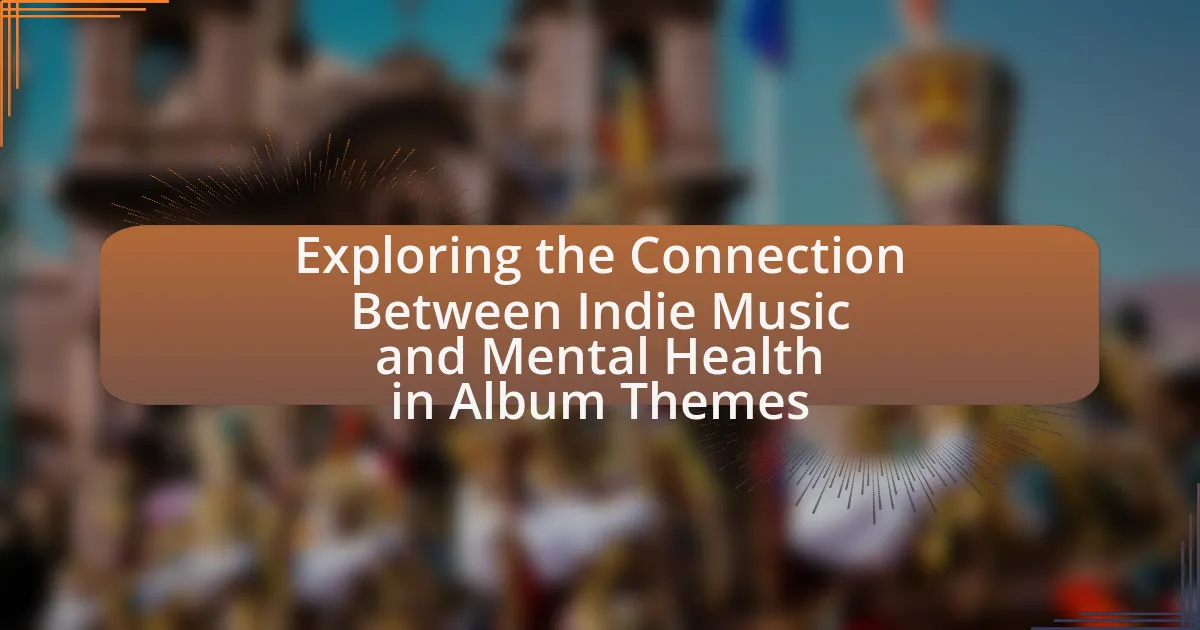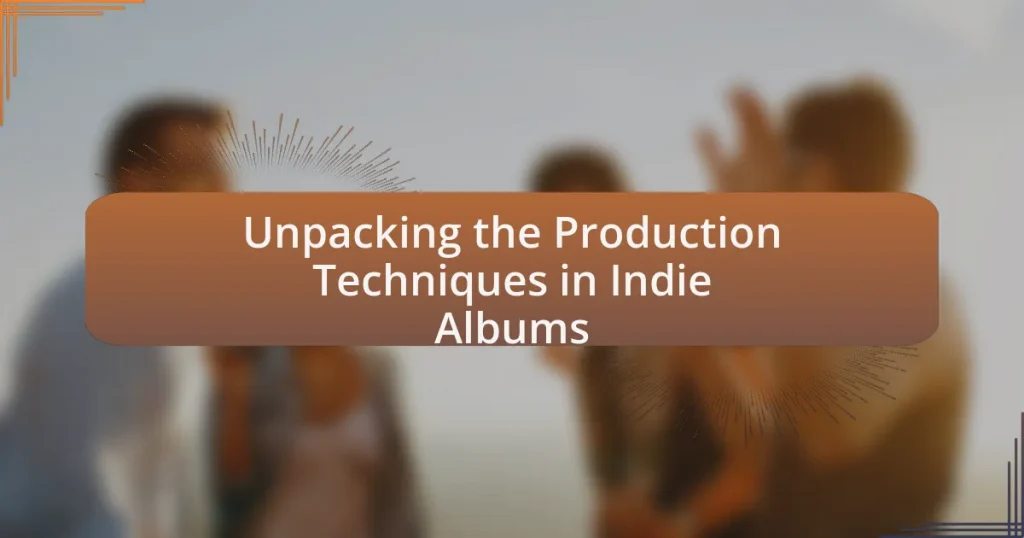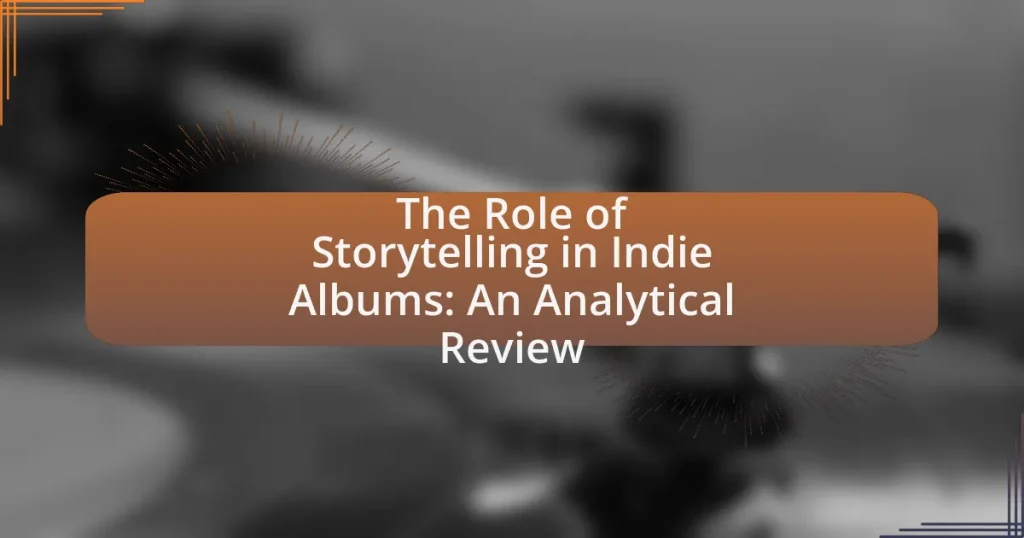The article examines the connection between indie music and mental health, focusing on how album themes reflect personal struggles with issues such as anxiety, depression, and existential crises. It highlights the use of introspective lyrics and emotional vulnerability by artists like Sufjan Stevens and Phoebe Bridgers, which resonate with listeners and foster a sense of community. The article also discusses the therapeutic potential of music, the role of authenticity in addressing mental health, and the impact of live music experiences on emotional well-being. Additionally, it provides practical tips for listeners on how to engage with indie music to support their mental health.
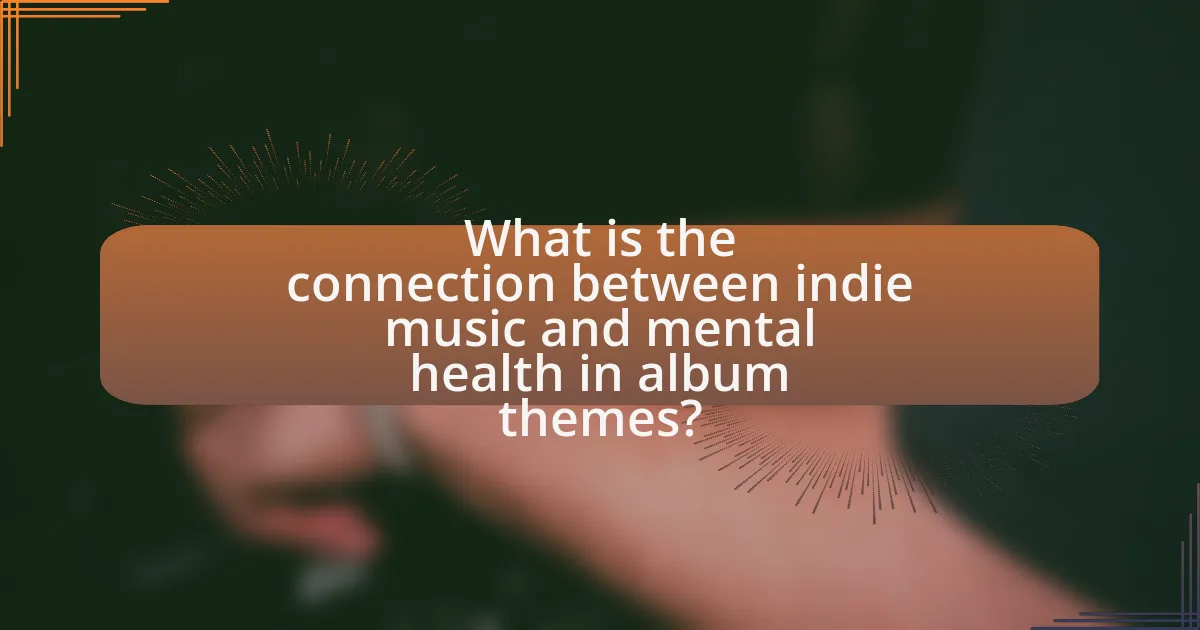
What is the connection between indie music and mental health in album themes?
Indie music often explores themes of mental health, reflecting personal struggles and emotional experiences. Many indie artists use their albums to address issues such as anxiety, depression, and existential crises, creating a relatable narrative for listeners. For instance, albums like “Carrie & Lowell” by Sufjan Stevens delve into grief and loss, while “Strange Mercy” by St. Vincent tackles feelings of inadequacy and self-doubt. Research indicates that music can serve as a therapeutic tool, with studies showing that listening to music can reduce symptoms of anxiety and depression, thereby reinforcing the connection between indie music and mental health themes.
How does indie music reflect mental health issues in its lyrics?
Indie music reflects mental health issues in its lyrics by addressing themes of anxiety, depression, and existential struggles. Artists often use personal narratives and raw emotional expression to convey their experiences, making the lyrics relatable to listeners facing similar challenges. For example, songs like “Creep” by Radiohead and “Motion Sickness” by Phoebe Bridgers explicitly discuss feelings of inadequacy and emotional turmoil, illustrating the impact of mental health on daily life. Research indicates that music can serve as a therapeutic outlet, with studies showing that listening to or creating music can alleviate symptoms of mental health disorders, further validating the connection between indie music and mental health themes.
What common mental health themes are found in indie music albums?
Common mental health themes found in indie music albums include anxiety, depression, loneliness, and existentialism. These themes often manifest through introspective lyrics and emotional melodies, reflecting the artists’ personal struggles and societal observations. For instance, a study by the University of California, Berkeley, highlighted that indie music frequently addresses feelings of isolation and the search for identity, resonating with listeners who experience similar emotions. Additionally, many indie artists use their platforms to discuss mental health openly, contributing to a broader cultural conversation about these issues.
How do artists use personal experiences to address mental health in their music?
Artists use personal experiences to address mental health in their music by translating their struggles and emotions into lyrics and melodies that resonate with listeners. This approach allows them to create authentic narratives that reflect their mental health journeys, often leading to greater awareness and understanding of these issues. For instance, artists like Sufjan Stevens and Phoebe Bridgers have openly discussed their battles with anxiety and depression in their songs, using specific anecdotes and emotional honesty to connect with audiences. Research indicates that music can serve as a therapeutic outlet, with studies showing that listening to or creating music can reduce symptoms of anxiety and depression, thereby reinforcing the impact of personal storytelling in music on mental health awareness.
Why is indie music a significant medium for discussing mental health?
Indie music is a significant medium for discussing mental health because it often features deeply personal and introspective lyrics that resonate with listeners’ emotional experiences. This genre allows artists to explore complex themes such as anxiety, depression, and identity, creating a relatable narrative that fosters connection and understanding. For instance, studies have shown that music can serve as a therapeutic tool, with indie artists like Sufjan Stevens and Phoebe Bridgers openly addressing their struggles, which can help listeners feel less isolated in their own mental health journeys. The authenticity and vulnerability present in indie music encourage open dialogue about mental health, making it a vital platform for raising awareness and reducing stigma.
What role does authenticity play in indie music’s approach to mental health?
Authenticity is central to indie music’s approach to mental health, as it fosters genuine expression and connection with listeners. Indie artists often share personal struggles and vulnerabilities in their lyrics, creating a relatable narrative that resonates with audiences facing similar issues. For instance, artists like Phoebe Bridgers and Sufjan Stevens openly discuss themes of anxiety and depression, which not only validates listeners’ experiences but also encourages open conversations about mental health. This authenticity helps to dismantle stigma and promotes a supportive community, as evidenced by the growing number of mental health initiatives within the indie music scene, such as benefit concerts and awareness campaigns.
How does the indie music community support mental health awareness?
The indie music community supports mental health awareness through various initiatives, including fundraising concerts, collaborations with mental health organizations, and the promotion of open discussions about mental health in lyrics and artist interviews. For instance, many indie artists participate in benefit shows where proceeds are donated to mental health charities, such as the National Alliance on Mental Illness. Additionally, platforms like Bandcamp have hosted campaigns where artists donate a portion of sales to mental health causes. This community-driven approach not only raises funds but also fosters a culture of understanding and support, as artists openly share their personal struggles with mental health, encouraging fans to seek help and engage in conversations about mental well-being.
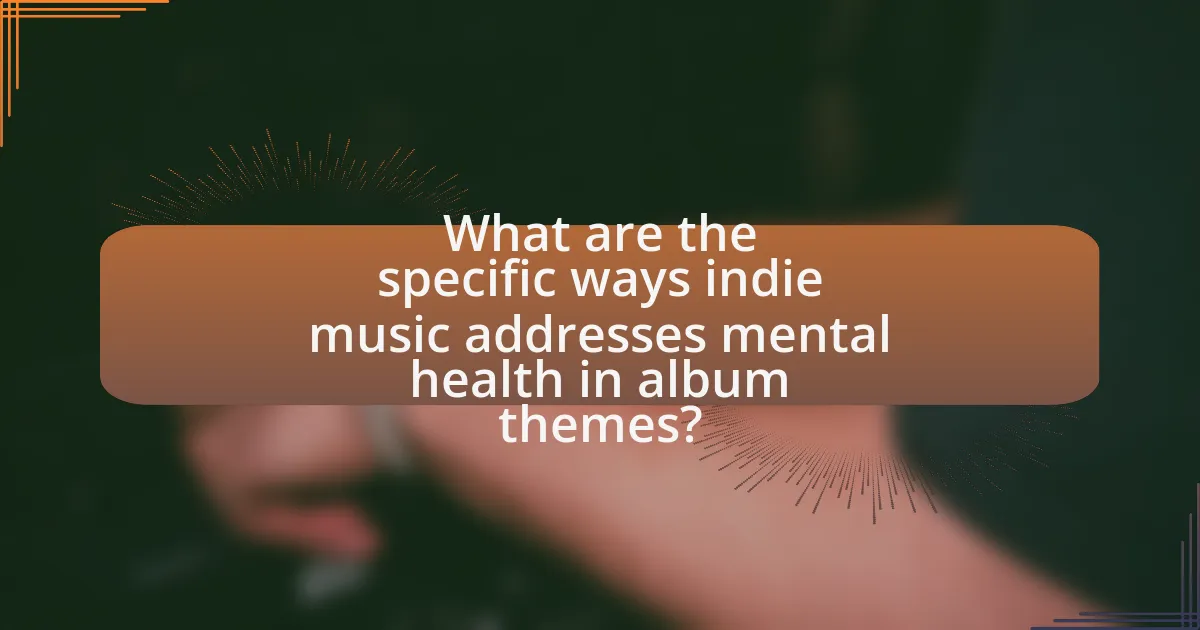
What are the specific ways indie music addresses mental health in album themes?
Indie music addresses mental health in album themes through personal storytelling, emotional vulnerability, and exploration of mental health issues. Artists often share their own experiences with anxiety, depression, and trauma, creating relatable narratives that resonate with listeners. For example, albums like “Carrie & Lowell” by Sufjan Stevens delve into grief and loss, while Phoebe Bridgers’ “Punisher” tackles themes of existential dread and mental illness. These works not only highlight individual struggles but also foster a sense of community and understanding among listeners, as they reflect shared experiences. The prevalence of such themes in indie music underscores its role as a medium for discussing mental health openly and authentically.
How do different genres within indie music approach mental health themes?
Different genres within indie music approach mental health themes through varied lyrical content, instrumentation, and emotional expression. For instance, indie rock often addresses mental health struggles with raw, confessional lyrics that resonate with listeners, exemplified by artists like Phoebe Bridgers, whose songs explore themes of anxiety and depression. In contrast, indie pop tends to incorporate more upbeat melodies while still addressing mental health, as seen in the work of artists like CHVRCHES, who discuss feelings of isolation and self-doubt within a more accessible sound. Furthermore, genres like folk-infused indie often utilize storytelling to convey mental health narratives, as demonstrated by Sufjan Stevens, who reflects on personal trauma and emotional vulnerability in his music. This diversity in approach highlights how indie music serves as a platform for exploring complex mental health themes across different musical styles.
What are the characteristics of indie rock albums that focus on mental health?
Indie rock albums that focus on mental health typically feature introspective lyrics, emotional vulnerability, and diverse musical experimentation. These albums often explore themes such as anxiety, depression, and personal struggles, allowing artists to express their mental health journeys authentically. For instance, albums like “The Suburbs” by Arcade Fire and “Carrie & Lowell” by Sufjan Stevens exemplify this focus through their poignant storytelling and reflective soundscapes. The use of raw, unfiltered emotions in songwriting serves to resonate with listeners, fostering a sense of connection and understanding regarding mental health issues.
How do folk and electronic indie artists tackle mental health in their work?
Folk and electronic indie artists address mental health in their work by incorporating personal narratives and emotional themes into their lyrics and soundscapes. For instance, folk artists often use storytelling to express struggles with anxiety, depression, and isolation, creating relatable content that resonates with listeners. Electronic indie artists, on the other hand, frequently utilize ambient sounds and experimental production techniques to evoke feelings of introspection and emotional depth, often reflecting on mental health challenges through their sonic choices. Research indicates that music can serve as a therapeutic outlet, with studies showing that listening to or creating music can reduce symptoms of anxiety and depression, thereby validating the approach taken by these artists in their work.
What impact do album themes have on listeners’ mental health?
Album themes significantly influence listeners’ mental health by evoking emotions and fostering connections to personal experiences. Research indicates that music with relatable themes can provide comfort, validation, and a sense of belonging, which are crucial for mental well-being. For instance, a study published in the Journal of Positive Psychology found that individuals who engage with music that reflects their emotional state often experience reduced feelings of loneliness and increased mood regulation. This connection between album themes and emotional resonance highlights the therapeutic potential of music, particularly in genres like indie, where themes often explore vulnerability and introspection.
How can listening to indie music promote mental well-being?
Listening to indie music can promote mental well-being by providing emotional resonance and fostering a sense of connection. Indie music often features relatable lyrics and diverse themes that reflect personal experiences, which can help listeners process their emotions and feel understood. Research indicates that music can influence mood and reduce feelings of anxiety and depression; for instance, a study published in the Journal of Positive Psychology found that engaging with music can enhance emotional regulation and improve overall mental health. Therefore, the unique characteristics of indie music, such as its authenticity and introspective nature, contribute positively to mental well-being by allowing individuals to explore their feelings and connect with others through shared experiences.
What are the potential risks of engaging with heavy mental health themes in music?
Engaging with heavy mental health themes in music can lead to several potential risks, including triggering emotional distress in listeners. This occurs because music that addresses topics such as depression, anxiety, or trauma can evoke strong emotional responses, potentially exacerbating existing mental health issues. Research indicates that individuals with a history of mental health challenges may experience increased feelings of sadness or anxiety when exposed to such themes, as noted in a study published in the Journal of Affective Disorders, which found that music can significantly influence mood and emotional states. Additionally, artists themselves may face risks, such as emotional burnout or vulnerability, when delving into personal mental health struggles in their work, which can impact their overall well-being and creative output.
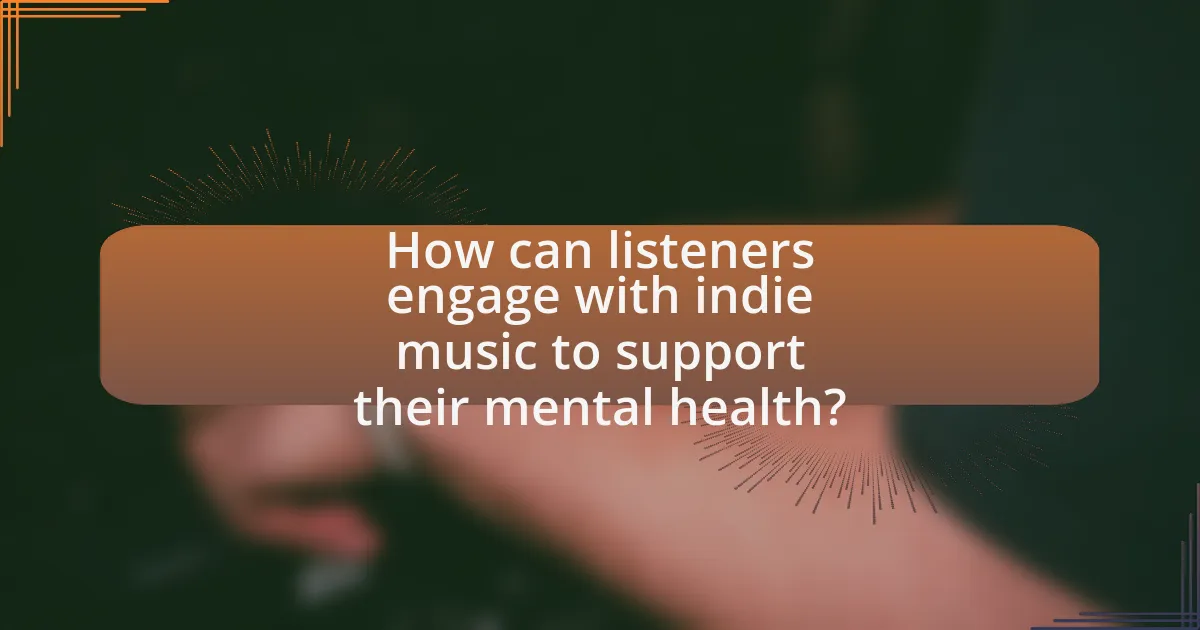
How can listeners engage with indie music to support their mental health?
Listeners can engage with indie music to support their mental health by actively seeking out and listening to albums that resonate with their emotions and experiences. This engagement allows individuals to connect with the themes of vulnerability, introspection, and authenticity often present in indie music, which can foster a sense of understanding and validation of their feelings. Research indicates that music can influence mood and emotional well-being; for instance, a study published in the Journal of Positive Psychology found that listening to music can enhance mood and reduce feelings of anxiety and depression. By creating playlists that reflect their emotional states or exploring new indie artists, listeners can cultivate a therapeutic experience that promotes mental wellness.
What are some recommended indie albums that focus on mental health themes?
Some recommended indie albums that focus on mental health themes include “Mental Illness” by Aimee Mann, which explores depression and anxiety through introspective lyrics and melodies. Another notable album is “The Glow Pt. 2” by The Microphones, addressing feelings of isolation and existential dread. “Carrie & Lowell” by Sufjan Stevens delves into grief and loss, reflecting on personal experiences with mental health. Additionally, “Lush” by Snail Mail captures the struggles of young adulthood and emotional turmoil. These albums are recognized for their poignant exploration of mental health issues, resonating with listeners through their authentic storytelling and emotional depth.
How can creating playlists of indie music aid in mental health management?
Creating playlists of indie music can aid in mental health management by providing emotional expression and fostering a sense of connection. Indie music often features relatable lyrics and diverse sounds that resonate with listeners’ feelings, allowing them to process emotions effectively. Research indicates that music can influence mood and reduce anxiety; for instance, a study published in the Journal of Music Therapy found that music listening can significantly decrease symptoms of depression and anxiety. By curating playlists that reflect personal experiences or desired emotional states, individuals can create a therapeutic tool that promotes relaxation, self-reflection, and emotional release.
What role does live music play in enhancing mental health for fans of indie music?
Live music plays a significant role in enhancing mental health for fans of indie music by fostering a sense of community and emotional connection. Attending live performances allows fans to experience shared emotions and collective joy, which can reduce feelings of isolation and anxiety. Research indicates that participation in live music events can lead to increased levels of oxytocin, a hormone associated with bonding and emotional well-being. Additionally, the immersive experience of live music can serve as a form of emotional release, helping fans process their feelings and improve their overall mood.
What practical tips can listeners apply when exploring indie music for mental health support?
Listeners can enhance their mental health support by actively engaging with indie music that resonates with their emotions. To do this, they should curate playlists that reflect their current feelings, as studies show that music can evoke emotional responses and facilitate emotional processing. Additionally, exploring lyrics that address mental health themes can provide validation and understanding, as many indie artists share personal experiences related to anxiety, depression, and self-discovery. Engaging in live music experiences, such as concerts or local shows, can foster a sense of community and connection, which is beneficial for mental well-being. Lastly, listeners can practice mindfulness by focusing on the music’s nuances, allowing them to immerse themselves fully in the moment, which has been shown to reduce stress and improve mood.
